Considering moving to Thailand from the UK? Make sure you read this first.
It’s hard to choose what expats love most about the Land of Smiles.
Is it the laid back lifestyle? The glorious tropical climate? The stunning scenery? The friendly people? The mouthwatering cuisine? Or maybe it’s the dynamic nightlife or the abundance of interesting things to see and do.
There are countless reasons why you should move to Thailand.
Here’s our guide to how you can make it happen…
Contents
Thailand Visa Requirements for Brits
UK citizens entering Thailand for longer than a period of 30 days must apply for a visa.
Listed below are the different types of visa Brits can apply for…
Visiting
Brits get a 30-day visa exemption on arrival into Thailand, which can then be extended by up to an additional 30 days if you apply for an extension at your local immigration office.
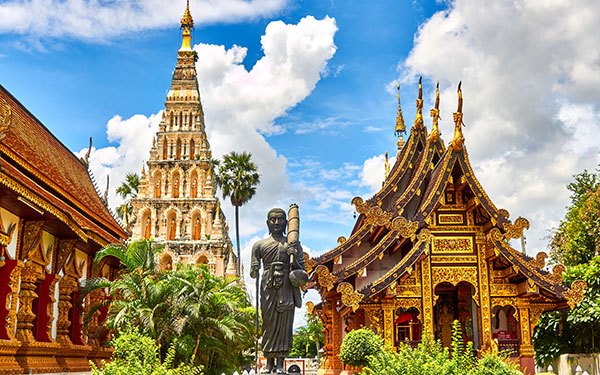
But if you’re planning to stay for this long from the outset, it’s definitely worth getting a tourist visa from your local Thai consulate in advance.
If you’re visiting Thailand for up to 60 days and you have no intention to work during your stay, you can apply for a tourist visa. To do so you will be required to supply a completed application form, a copy of your passport with a minimum of 6 months validity left to run, proof of onward travel such as a return plane ticket, proof that you have enough money to fund your trip, and passport photos.
If after your 60 days is up you want to prolong your stay, you can apply for a 30 day tourist visa extension.
It’s also possible to apply for a multi-entry tourist visa, which can be used in such a way that you can spend up to 9 months in Thailand, with a few international trips in between.
You can hear more about applying for this visa here:
Working
Do you want to work whilst in Thailand?If so, you can apply for a business visa — aka Non-Immigrant B visa — which entitles you to conduct business for a period of 90 days for a single entry into the country, or for one year if you intend to leave and re-renter multiple times.
This visa is renewable annually, and also entitles you to open a Thai bank account.
Applications for a business visa must be made before you enter the country, and require a valid passport, medical certificate, the address where you will be staying whilst in Thailand, and a letter of employment from your Thai employer.
Permanent Residency
If you want you join the thousands of Brits who have already made Thailand their permanent home, you will need to apply for permanent residency.
Doing so provides multiple benefits, including allowing you to become a property owner, obtain a work permit, and live permanently in the country without further need to extend your stay.
Before you can apply for permanent residency, you must be sure that you fulfil certain legal criteria.
You must have already been resident in Thailand having held a non-immigrant visa for at least three consecutive years and be in possession of one at the time of application, and must either make an investment in the Thai economy of 3 to 10 million THB, be a highly skilled academic or expert in a desirable field, or be in a relationship with a Thai citizen or another foreigner who already has permanent residency.
Way of Life in Thailand
Lifestyle
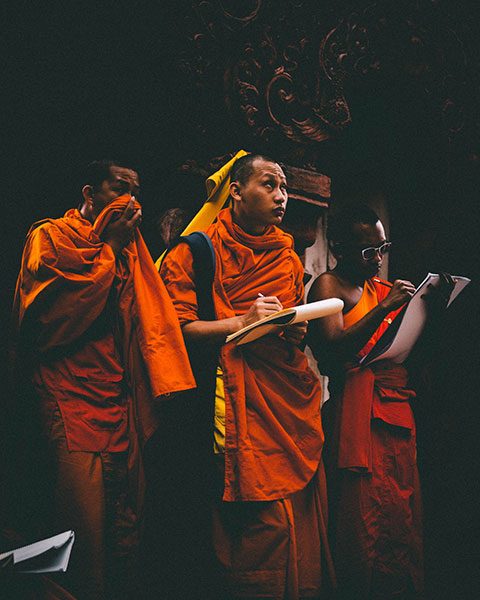
Life is good in Thailand, and the Thai people are well known for their friendliness and hospitality, but they are also a deeply religious people, and worship plays a big part in their daily lives.
All throughout the country Buddhist monks in bright orange robes can be seen daily on their early morning walks asking for alms, and many colourful festivals are celebrated throughout the year.
Food is another focal point of Thai culture, with mealtimes being a big family affair comprising multiple spicy, mild, sweet, and sour dishes dishes such as curries and stir fries, rice and noodles, and marinated grilled meats and fish.
In recent times however it has become much more common for Thai people to eat out in restaurants.
The king is the most important person in the country for Thai people, and he is assigned almost godlike status by the population. Images of the king appear everywhere, and in cinemas the royal anthem is played before the start of the film.
The pace of life is generally easygoing and laid back in Thailand, with a favourite expression amongst Thais being ‘mai ben rai’, or ‘no worries’.
For expats, the lifestyle can differ depending on location.
Big cities like Bangkok have vast amounts of entertainments, restaurants, shops, vibrant street life, and large expat communities, whilst island or beach resort living is beautiful and offers plenty to do when the weather is good, but can sometimes grind almost to a halt come rainy season.
Getting Around
Like most things in Thailand, travelling around the country is relatively inexpensive.
When journeying between cities, buses are cheap and convenient; ordinary buses are the cheapest, but can be slow and crowded, as well as lacking mod cons like toilets and air conditioning.

More commonly used are the second class, first class and VIP buses which are considerably more comfortable, with VIP buses offering express services.
Night buses are a good option for long distance journeys.
Trains in Thailand offer an inexpensive, scenic way to travel, and there are 4 main lines which connect the major cities throughout the country.
As with buses, there are different types of train. Ordinary trains are the slowest and tend to operate on shorter routes, while Special Express trains are considerably faster. Sleeper cars are available for overnight trips, and nearly all trains contain a dining carriage. The fare you pay will depend on your chosen route and ticket class. For longer journeys it is recommended to travel first or second class to benefit from better seats and air conditioning.
Air travel is the fastest and most reliable way to travel the kingdom, and there are plenty of budget airlines offering a choice of cheap domestic flights daily to get you from A to B.
Major airlines include Thai Airways, AirAsia, NokAir, and Bangkok Airways. For onward travel you can take one of the many taxis or minibuses that line up outside waiting for passengers.
In towns and cities most people get around by taxi, motorbike or occasionally tuk tuk, and Bangkok boasts both a metro system and a high speed Skytrain.
Taxis. motorbikes and tuk tuks can be hailed on the street, with some taxis being metered. In the case of tuk tuks and unmetered cabs, it is crucial to agree to the price of your fare before you set off.
When travelling to and between islands without airports, your best bet is to take the ferry.
Ferry services run regularly throughout the day, and tend to stick to schedule, although it’s worth bearing in mind that there have been a few cases of ferries capsizing due to being overloaded.
Driving in Thailand
If you’ve got your own transport or you are thinking of hiring a car or motorbike, there are a few things to consider.
The road accident rate in Thailand is fairly high, with many drivers being aggressive and driving at excessive speeds — particularly lorry and bus drivers.
Cities are often congested, but in other areas roads generally run more smoothly, with major routes having road signs written in English as well as Thai.
As in the UK, Thais drive on the left hand side of the road, and Brits should be able to get by with their UK driving license — although to avoid any possible problems it can be a good idea to get an additional international licence.
When hiring vehicles it is best whenever possible to hire from reliable international companies such as Avis or National, and take out insurance with them.
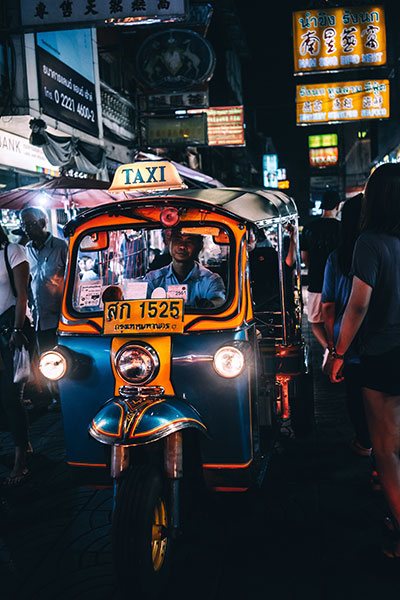
If you have no other option but to hire from a local company — especially if you are hiring a motorbike or scooter — be sure to check the vehicle thoroughly to be sure that it is in good working order.
If possible take a test drive, and remember that you will be liable for any damage caused whilst the vehicle is in your hands.
Weather in Thailand
Thailand enjoys a wonderful tropical monsoon climate with annual average temperatures ranging from 22°C to 27°C, and with three relatively distinct seasons — hot, rainy, and cool.
The weather can vary greatly from north to south, but as a general rule the rainy season falls between June to late October, and brings thundery bursts of shower in the afternoon and during the night. Temperatures are a little cooler during this time, but it can get uncomfortably humid and sticky at times.
In the cool season between November and February, temperatures remain pleasant and rainfall is minimal, although it can get chilly at night.
Sun worshippers will adore the hot season from March to May which sees a rise in temperatures — sometimes high into the 30°Cs — and dry skies.
The south of the country however has just wet and dry seasons, and sees a little more rainfall than the north.
Cost of Living in Thailand
Lifestyle
Aside from being amazing, Thailand is also cheap, however the cost of living in Thailand will vary depending on which area you choose live in.
Living in popular tourist areas such as Bangkok or Phuket for example is considerably more expensive than living in more rural areas, but even Bangkok remains 61% cheaper than London on average.
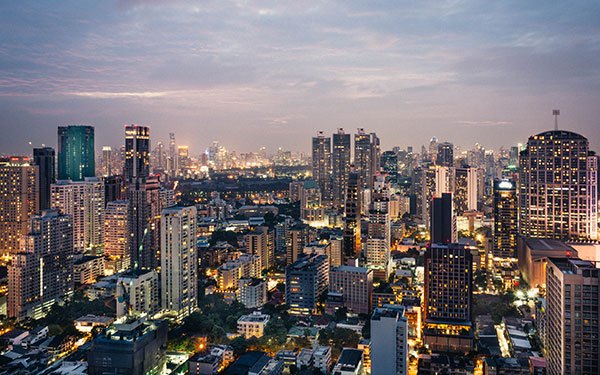
Eating out and entertainment can be very affordable if you stick to non imported produce and street food or cheaper eateries.
Meals out in high class restaurants will understandably still put a dent in your wallet, and nights out drinking in bars can also be expensive.
Food and groceries are cheap, although prices are higher on the islands where goods mainly have to be shipped in from outside.
Clothes and electrical goods can be bought at fairly low prices, and transport is also very affordable – even in the cities. Utilities such as water and electricity, and mobile phones, are significantly cheaper than in the UK.
Rent
When it comes to rental costs in Thailand it’s all about location, location, location. Properties in Bangkok and along coastal or island areas can be relatively expensive, but there are still plenty of affordable options available.
Luxury apartments in Bangkok can easily cost thousands per month, but a one room apartment in the city centre can be had for around 3000 to 4000 THB.
The suburbs are much cheaper, and if you’re willing to live a little away from the action the same amount will get you a 3 bedroom townhouse.
Healthcare
Healthcare in Thailand is of a good standard, and many doctors speak English.
Both public and private hospitals are available, but public hospitals tend to be under greater pressure and patients can experience long waiting periods.
Medical costs are reasonable, but most expats choose to take out private health insurance in order to access the best possible healthcare.
Many international insurance companies provide insurance policies for expats living in Thailand, and prices can be competitive so it’s worth shopping around.

Schooling
Like most other countries, Thailand has both public and private schools — but what is the best choice for expat families?
Whilst it is possible to send foreign children to public schools, schools will not accept them unless one parent is a Thai national or they have been born in Thailand. In addition lessons are taught in Thai, which can be problematic for many expat kids.
As a result most expats send their children to private international schools where the curriculum is very similar to that in the UK and lessons are taught in English.
International schools are available at primary, lower secondary, and upper secondary level, but fees can be high costing anywhere between the equivalent of £9000 to £15000 per year.
Popular Areas for Brits
Bangkok
The crazy, wonderful city of Bangkok is a cosmopolitan metropolis of gleaming skyscrapers, luxury hotels and restaurants, chic bars, and world-class shopping, alongside bustling markets, historical palaces and temples, and the majestic Chao Phraya river.
Bangkok is home to large expat communities, and there’s no shortage of social events and activities for foreigners to take part in.
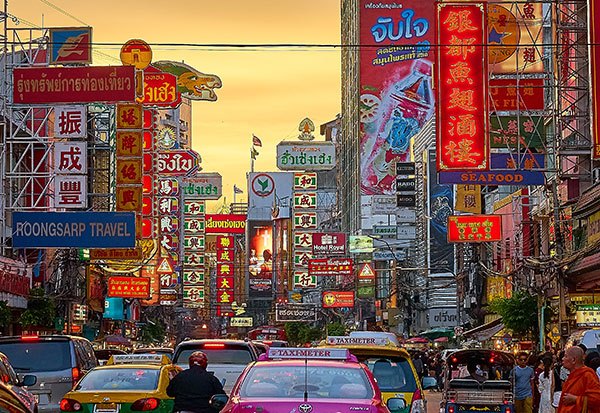
Chiang Mai
Cool, calm and oozing charm, Chiang Mai is a laid back beauty surrounded by misty mountains.
The centre of Lanna culture, many hill tribes still live outside of the city, and there are plenty of opportunities for outdoor adventure.
At the heart of Chiang Mai, the walled ancient city hides temples galore, and all over the city are excellent restaurants, bars and markets to enjoy.
Pattaya
It may have a sleazy reputation for ladyboys, prostitutes and gogo dancers, but Pattaya is also a beautiful beach-side city bursting with opportunities for fun in the sun, including watersports and water parks, bars, restaurants and clubs, plus fantastic temples, museums, and galleries for the discerning expat.
Phuket
Breathtakingly beautiful, the island paradise of Phuket has it all.
Lush jungle covered mountains are perfect for trekking, there are plenty of places to chill out on heavenly white sand beaches or take a dip in the turquoise ocean, or you can party the night away at late night clubs.
Phuket is also known for its restaurants serving gourmet seafood fished fresh from the sea, and there are lots of expat clubs for making new friends and socialising.
Koh Samui
For palm fringed beaches, awesome clubs and beach bars, and fancy restaurants, you won’t find a better place than hip Koh Samui.
This seductive island also offers the ultimate in relaxation — from chilling with a cocktail on the golden sands to sublime spa experiences and yoga retreats — and it even has its own international airport to boot.
Hua Hin
A glittering jewel on Thailand’s coast just a short hop from Bangkok, Hua Hin is a long time favourite holiday destination for Thais and foreigners alike.
Attracting a well heeled clientèle for decades and popular with families, this laid back city offers inspiring scenery, glorious beaches, world class golf courses, elegant restaurants, lively bars and much, much more.

Jobs in Thailand for British Expats
Thailand isn’t the easiest place for expats to find work, but that doesn’t make it impossible.
If you can learn some Thai it will greatly improve your chances of getting a job, but there are also numerous international companies working out of the big cities looking for qualified employees.
If you’re after a well paid, high powered position you’ll need a good CV with plenty of experience before considering to apply.
Teaching English is also a popular occupation for Brits in Thailand, but usually requires a TEFL certificate.
The real estate, tourism, and hospitality industries will also always have demand for foreign workers. Another option is to do what many expats living in Thailand have already done and start up your own business.
Are you considering a move to Thailand from the UK?






1 Comment
I love to leave in Thailand one day because is always my dream to move to Thailand.